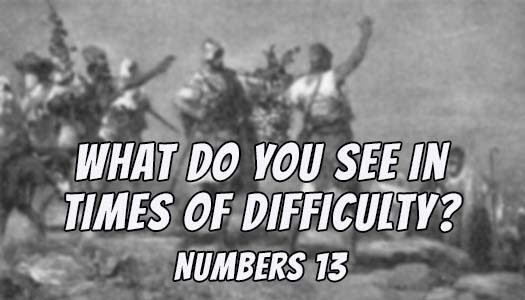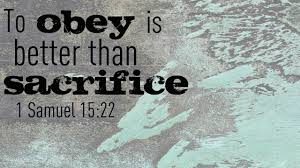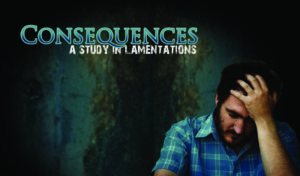Should We Disrupt the Peace of the Church in Order to Deal With A Doctrinal Issue?
You don’t have to be a church leader for very long before you realize that you get a whole lot more done when things are calm and peaceful, than when people are arguing and the church is in chaos. And it has been my experience that churches, for the most part, prefer for things to be peaceful and they strive for unity.
Recently, I have been reminded that it is the church leader’s responsibility to guard the doctrine of the church and to guide the church toward a clear understanding of why it is that the church believes what it does. Doctrines, Creeds, and Constitutions act as guard rails against disunity and conflict. They provide a space for the members of the church to express their faith in such a way that is agreed upon, and supported by the local church as a whole. Everyone is in agreement on what this church is, what it is to do, what members are to do, who is and who is not a member, leadership, etc.
So, what happens if things are calm, but there is a doctrinal issue that needs to be addressed? By dealing with the issue, it may cause conflict. But to ignore what you know to be false, in order to maintain peace is a false unity because it is not rooted in truth. The church cannot strive toward a common mission, if the mission is blurred and convoluted and the core beliefs are not supported. Doctrines, Creeds, and Constitutions actually provide a way for people of like mind to have unity. Baptists go to Baptist churches because they agree with Baptists thinking toward the Bible.
A Baptist should not go to a Methodist church and demand they do things “the Baptist way.” That assumes, of course, that people actually know what they believe. Southern Baptists have such an agreement called, The Baptist Faith and Message and many would specify which version they support (BFM 2000 for example). While SBC churches are autonomous, they have an agreed upon doctrinal statement that defines what it means to be Southern Baptist. Conflict within the SBC happens when individual churches or leaders step outside of those agreed upon beliefs and practices.
Guarding the agreed upon doctrinal beliefs and practices actually produces peace in the long run and the church accomplishes its’ biblical mandates. John Piper and NT Wright are both Christian men, pastors, authors, etc. but John Piper wrote a book addressing where he feels NT Wright is wrong on the issue of justification. So, in the opening chapters Piper addresses this issue of addressing wrong doctrine, and the cost of causing a disruption or potential disunity.
“The assumption of the entire New Testament is that we should strive for peace. Peace and unity in the body of Christ are exceedingly precious. ‘Behold, how good and pleasant it is when brothers dwell in unity!’ (Psalm 133:1). ‘Seek peace and pursue it (1 Peter 3:11). ‘So then let us pursue what makes for peace and for mutual upbuilding’ (Romans 14:19). But just as clear is that we are to pursue peace by striving to come to agreement in the truth. ‘the wisdom from above is first pure, then peaceable’ (James 3:17). It is first pure. Peace is not a first thing. It is a derivative. It comes from a hearty agreement in truth.”[1]
Therefore, let us have sound doctrine, agreed upon practices, and peace in the body. But until we have clearly established the first two, we will not have the last.
_________________
[1] John Piper, The Future of Justification, A Response to N.T. Wright (Wheaton, Illinois; Crossway Books, 2007) 30.

 About 350 years ago a shipload of travelers landed on the northeast coast of America. The first year they established a town site. The next year they elected a town government. The third year the town government planned to build a road five miles westward into the wilderness. In the fourth year the people tried to impeach their town government because they thought it was a waste of public funds to build a road five miles westward into a wilderness. Who needed to go there anyway?
About 350 years ago a shipload of travelers landed on the northeast coast of America. The first year they established a town site. The next year they elected a town government. The third year the town government planned to build a road five miles westward into the wilderness. In the fourth year the people tried to impeach their town government because they thought it was a waste of public funds to build a road five miles westward into a wilderness. Who needed to go there anyway?
 “Selective obedience” is disobedience. When we choose what to obey, we are effectively telling God that we are His masters and have the right to decide for ourselves. Such people do not understand the meaning of obedience.
“Selective obedience” is disobedience. When we choose what to obey, we are effectively telling God that we are His masters and have the right to decide for ourselves. Such people do not understand the meaning of obedience. When I was a kid I took several art classes but on one occasion I had the assignment to sketch with charcoal a basket with fruit in it. Every time I would sketch it, I would lean in and meticulously draw each and every detail that I saw, except at the end my drawings would always be skewed and disproportionate. So the instructor told me to try again, but every few moments lift my head and step back and look at the whole drawing, and take in the big picture. My problem was that I was not looking at the whole picture; I was only focusing on one section at the time.
When I was a kid I took several art classes but on one occasion I had the assignment to sketch with charcoal a basket with fruit in it. Every time I would sketch it, I would lean in and meticulously draw each and every detail that I saw, except at the end my drawings would always be skewed and disproportionate. So the instructor told me to try again, but every few moments lift my head and step back and look at the whole drawing, and take in the big picture. My problem was that I was not looking at the whole picture; I was only focusing on one section at the time.